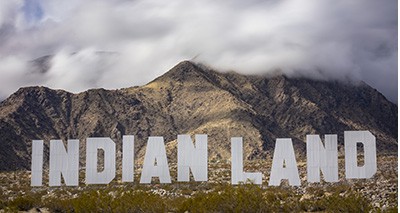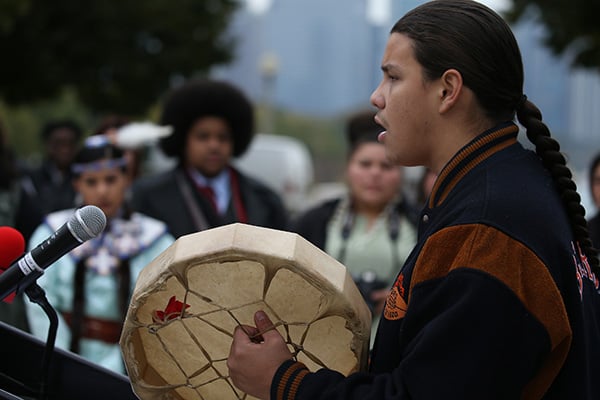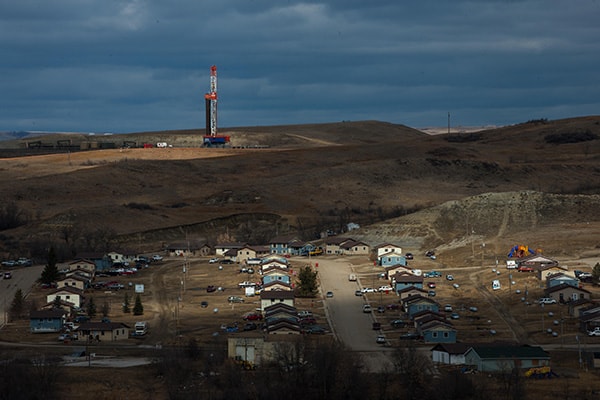The Real Meaning of ‘Land Acknowledgements’
- Post AuthorBy Gregory Hood
- Post DateFri Jan 13 2023
Credit Image: © David Poller/ZUMA Wire
The “indigenous land acknowledgment” ritual is both petty and sweeping. It’s almost comical how it claims territory in the name of small bands of people. It’s also audacious in the way it undermines the very concept of America. And it is spreading everywhere: colleges, churches, cities, states. Land acknowledgement at the national level is entirely possible. What would that mean?
The rot began in Australia. Labor Prime Minister Paul Keating arguably redefined Australia’s national identity when he berated whites in 1992:
Isn’t it reasonable to say that if we can build a prosperous and remarkably harmonious multicultural society in Australia, surely we can find just solutions to the problems which beset the first Australians, the people to whom the most injustice has been done. And, as I say, the starting point might be to recognize that the problem starts with us non-Aboriginal Australians. It begins, I think, with that act of recognition.
Recognition that it was we who did the dispossessing. We took the traditional lands and smashed the traditional way of life. We brought the diseases. The alcohol. We committed the murders. We took the children from their mothers. We practiced discrimination and exclusion. It was our ignorance and our prejudice.
Mr. Keating set up a “Reconciliation Council” that led to the “Acknowledgement of Country” practice, in which whites ritualistically say that the land they are on belongs to someone else.
“Reconciliation” spread to Canada. From 2008 to 2015, because of the supposed scandal of Indians being educated in Western schools, the government established a Truth and Reconciliation Commission of Canada. Liberal Prime Minister Justin Trudeau has pushed “land acknowledgements,” which are now recited at hockey games, cultural events, and government functions. “The day at Admiral Collingwood Elementary School here on the banks of the Georgian Bay begins not with Canada’s national anthem,” wrote the Washington Post, “but with a reminder of the country’s dark colonial history.”
Justin Trudeau wears a headdress given to him by the Calgary First Nation.
In both Canada and Australia, a major supposed sin was educating Indians in Western schools. Presumably, whites should have left them in the Stone Age.
“Reconciliation” should mean putting grudges aside, but this movement seeks out new grudges — some of them based on fairy tales. In Canada, activists made sensational claims about mass graves of Indian students at Catholic schools. No one could find the graves, but that didn’t matter. Mobs burned Catholic churches and smashed statues of Mary. The Canadian government apologized. Pope Francis seemed embarrassed by the Church’s earlier efforts to spread the faith and didn’t complain about attacks on churches. Instead, he went to Canada and groveled before Indian activists.
In 2022, New Zealand Prime Minister Jacinda Ardern, always eager to apologize on behalf of whites, said the government “profoundly regrets its horrific and needless acts of war and raupatu (land confiscation)” and apologized for not respecting the “mana whakahaere (authority.)” New Zealand is considering changing its name to a Māori word. It’s hard not to be reminded of what happened when Rhodesia got its new name.
“Reconciliation” is never complete. What would become of the activists and bureaucrats if it were? Australia has a “Reconciliation Barometer” that claims the country is on the right track, but warns that “experiences of racism are increasing.” The more money spent on stamping out racism, the more racism activists seem to find.
These efforts aren’t about reconciliation but dominance and power. The original “Truth and Reconciliation Committee” was the one set up after the fall of South Africa. Though it gave amnesty to some white South African leaders, it marked a change in the character of the state. Modern South Africa, with its now traditional power outages, is no longer the well-run country it used to be. Will the “new” Canada, Australia, and New Zealand also become minority-majority countries with dispossessed white populations?
Since the George Floyd riots of 2020, the United States has careened into an unprecedented level of iconoclasm, censorship, and re-education. And we are now following the rest of the Anglosphere with increasingly widespread “land acknowledgements.” Mentioning the tribes by name is important, because naming specific “victims” makes the occupation and colonization more personal and hideous.
School board meetings at the Boulder Valley School District in Colorado used to start with the Pledge of Allegiance. Last year the board voted to ditch pledge for a different statement: “We acknowledge the atrocities committed here, including the painful history of genocide, forced assimilation, and efforts to alienate the Indigenous inhabitants from their homeland . . . .” The land was “unjustly and illegally taken territory of the Ute, Puebloan, Arapaho, Cheyenne, Apache, Navajo, and 48 other tribal nation.” Activists want the full statement plastered around every school. “When you walk into any school building, it should be the first thing that you see,” says one.
Microsoft has joined the movement. “We need to acknowledge that the land where the Microsoft campus is located is traditionally occupied by the Sammamish, Duwamish, Snoqualmie, Suquamish, Muckleshoot, Snohomish, Tulalip, and other coastal Salish people since time immemorial,” said a company communications manager, who added that the company is “continuing to honor and bring to light their amazing heritage.”
The Rhode Island towns of Warren, South Kingstown, and Barrington read “land acknowledgements” at town meetings. Portland, Oregon is also considering whether to add to its charter an admission that it sits on “stolen land.”
The county of Hennepin in Minnesota has its own self-abasing statement. Commissioner Irene Fernando says that “acknowledging that their land was taken and occupied is the least we can do.”
At Princeton University, “Land Acknowledgements” recognize that the university sits on the “ancient homeland” of the Lenni-Lenape people. Princeton ignored the Indians at the time, but now treasurers its “historic links” with them.
Churcheslove to confess their sins. There are countless other examples and we encourage readers to write in the comments below what is happening in their communities and institutions.
Adrien Pochel of Cree and Lakota tribe drums and sings outside the Field Museum during a land acknowledgement ceremony. (Credit Image: © Antonio Perez/Chicago Tribune/TNS via ZUMA Wire)
To say that America is “occupied” is to say whites don’t belong here. That’s the message of Indigenous People’s Day as opposed to Columbus Day. It’s a way of redefining America from an outpost of Western Civilization to a landmass populated by non-white groups, all oppressed by whites, which really belongs to the “indigenous.” Alexandria Ocasio-Cortez has tried to rebrand Hispanics as “indigenous” in her effort to abolish immigration laws.
Our children are being taught they don’t belong in the only country they’ve ever known. Leading institutions teach them guilt and shame. The result is that white Americans are in a country where we are not just unrepresented, but increasingly seen as illegitimate occupiers. White Americans are ill-equipped to fight this. Part of the problem is that the words “nation,” “state,” and “country” are often used interchangeably. They shouldn’t be.
A nation can exist without a state. The state, properly considered, is the government or the regime. A nation is the people. A legitimate country worthy of one’s loyalty is the political expression of the nation. There are nations without states, such as the Kurds, the Tamils, and the Igbos. The plight of “stateless nations” are responsible for many of modernity’s bloodiest conflicts and fiercest political battles.
Whites in many countries are becoming stateless. America has been redefined from the top, and land acknowledgements are an important part of this effort. Some conservatives may try to dodge the issue by saying that America is a proposition nation, dedicated to ideas. If our founding idea is “freedom,” the American Experiment already failed. Others may say it’s the supposed founding principle of egalitarianism. That, of course, is an impossible goal.
“Land acknowledgements” advance the claim that the land truly belongs to “indigenous people.” The logical conclusion is that our presence is a crime and our time is borrowed. When a country’s leading institutions teach our people guilt, shame, and self-hatred, it’s not our country. Land acknowledgements won’t stop with words. Once guilt is admitted, reparations must follow.
California, which was never even a slave state, is considering hundreds of thousands of dollars per person in reparations for blacks. Universities that supposedly benefitted from slavery are also considering reparations. American Indians (or those who can fake being American Indians) would be foolish not to demand more handouts.
However, American-style “land acknowledgements” pick an arbitrary point in history — the arrival of whites — and pretend a specific tribe had always owned that land. This is nonsense. Tribes fought each other before and after whites arrived.
There are few areas of the world that were truly unsettled until modern times. Iceland is the exception, and it remains largely homogenous. And, of course, arguments about a people’s “right” to a territory change, depending on the interests of our rulers.
NATO is supplying weapons to defend a Ukrainian nation that bans religious organizations with links to Russia, strips the citizenship of subversives, censors foreign media (even before the war), and is banning certain Russian books, music, and media.
This isn’t to say these actions are good or bad, only to say that the United States has no principled position when it comes to defending ethnonationalism. It’s impossible to imagine President Joe Biden banning Spanish-language media because it’s subversive. Powerful institutions in America now celebrate blood and soil nationalism within and against the United States but oppose efforts by American patriots to do the same. Our opponents will not give whites the same rights of self-determination and cultural autonomy they grant to obscure Indian tribes.
“I am for whites, because I am white,” said Emperor Napoleon I, “I have no other reason, yet that is reason good enough.” It’s good enough for everyone else, but it’s not good enough for whites. Whites are unique in our moral universalism. Mere self-interest isn’t enough to convince whites to act. Most whites must have a universal moral philosophy to justify their actions.
But shouldn’t land acknowledgement obligate whites to leave? Staying is worse than stealing something, admitting the theft, and then refusing to give it back. It’s like stealing something, admitting it, apologizing, and then continuing to steal even as you keep saying you’re sorry.
Land acknowledgements are part of a struggle for status and power, not justice. It’s tribal warfare. We’re surrounded by far-right nationalists. They just aren’t white, and, unfortunately, they are within our borders. The claims that having to learn about European cultures, mix with Europeans, or operate within European society constituted cultural genocide should mean we can shrug off moral demands that we are required to integrate with everyone on Earth.
American Indians supposedly have a subordinate position in this country, but they have all the benefits of citizenship plus rewards for being in the right bloodline. They also enjoy a certain amount of self-rule. This sounds ideal to whites, who lack any real political representation. Most Indian reservations in the United States are plagued with poverty and crime. A white “reservation” in America with some autonomy would quickly resemble Orania in South Africa.
An oil rig sits behind 4 Bears Village on the Fort Berthold Indian Reservation in North Dakota. (Credit Image: © Alexandra Hootnick/ZUMA Wire/ZUMAPRESS.com)
Europe also apparently has an eternal responsibility to bring in vast non-white populations. Countries that never had a colonial empire or who even suffered under non-white rule until quite recently are not exempt. Whites have nowhere on Earth to call their own. It also seems that “forced assimilation” was a crime against humanity when Indians were taught to read, but it is the highest virtue when white students were forced to integrate their schools.
We know why whites returning to Europe, or some grand division of the races into their “ancient homelands” won’t work. They would follow us. Matthew Caldwell’s recent first-person piece, “I Hate You; Don’t Ever Leave Me,” shows the truth about why we can’t go back to Europe, or anywhere else. Self-determination for all peoples sounds like a nice solution, but non-whites will not leave whites alone.
In the end, it’s not about American Indians, or blacks, or anyone else. It’s about us. Why should whites go along with land acknowledgements, particularly when there seems to be no “reconciliation”? Many whites just mouth humbug that, for now, has no economic consequences. Saying such things may show your moral superiority above other whites, which always seems to be white progressives’ real concern.
But we should ask those goofy whites who go along with this nonsense when they are leaving. If they truly believe this is stolen land, they should go. If they don’t, and the sole sacrifices they are willing to make are to come from reparations extracted from other whites, we can dismiss them out of hand.
The real lesson whites should take from these tribes is that mass immigration is a disaster. If it continues long enough, your nation or tribe no longer has a country. If “land acknowledgements” and other anti-white rituals spread, many more whites will understand that. Ideas are often taken to their logical conclusion. White advocates are just a bit ahead of the curve in spotting what’s coming.
- Post TagsAustralia/New Zealand, Featured, Groveling, Indians



